Too many fresh eggs in warmer months, but too few in winter? It’s time to learn how to preserve eggs. Here are 5 simple methods.
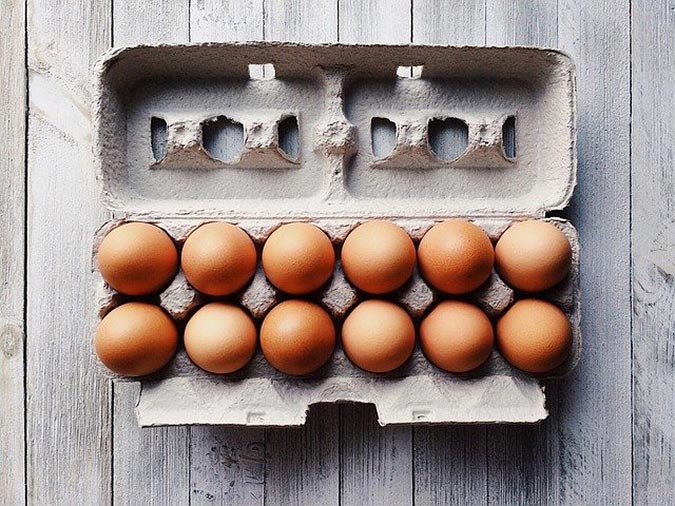
Image by Wokandapix from Pixabay
Get Cracking! 5 Top Tips for How to Preserve Eggs
For some 40 years, I had never eaten a fresh egg! Does that sound crazy to you? Looking back on it, it sure sounds crazy to me.
Naturally, I had eaten fresh eggs from the grocery store—but never a fresh-laid backyard egg or anything like it. That all changed about 10 years ago when my neighbor got chickens and soon found himself with so many extra eggs that he started bringing them over to my house by the dozen! With my first bite, my eyes were opened.
My world—and my breakfast—would never be the same.
You May Also Enjoy:
“Comparing Eggs and Five Things To Look for In Every Egg You Eat”
For weeks, my nice neighbor provided me with eggs, and I gladly offered to pay for them. It was a super deal for both of us until one day I saw him getting into his car and asked if he had any eggs I could buy.
“Nope,” he sighed. “For some reason, they just haven’t been laying lately.”
Learn how to raise your very own flock—and keep the eggs and meat coming no matter what the global supply chain is doing! Click here to save BIG on our Backyard Chickens 101 bundle!
This was a real problem for both of us. After some research, we learned what anyone who has ever kept chickens knows all too well. That is, while your consumption of eggs tends to remain fairly constant all year long, your hens’ production of these enjoyable gems of nutrition doesn’t. That bit of homestead knowledge led us to look into ways to preserve fresh eggs for leaner times.
The 1,000-Year-Old Egg
There is an old joke that states, “The best way to keep an egg fresh is to keep it in the chicken.” That may well be, but it was not what we needed, so we went to the library and started doing some research.
That led us to the 1,000-year-old egg. Okay, I can hear you now: “A 1,000-year-old egg? Yuck!”
That’s what I thought too. But it turns out that this Chinese delicacy—also called a century egg—is made by preserving chicken, duck, or quail eggs in a mixture of ash, clay, quicklime, salt, and rice hulls for several weeks to several months. (The eggs, of course, are not really preserved for a century, let alone 1,000 years! That’s just a cute name they give to eggs preserved in this way.)
This process causes the yolk of the eggs to take on a creamy, cheese-like texture. It also transforms the whites into a dark-colored jelly.
You May Also Enjoy:
“DIY Potting Soil Recipe Using 3 Simple Ingredients”
“Simple & Effective Worm Composting (VIDEO)”
“Aerobic Compost Tea, Worm Tea, and Leachate—A Clarification”
According to legend, these eggs have existed for centuries after their accidental discovery dating back to the Ming Dynasty (1368–1644) in China. A resident of the Hunan province supposedly discovered duck eggs in a pool of slaked lime leftover from the construction of his house two months earlier.
After tasting the eggs, he decided they were so good he had to make more. I don’t know if I could have or would have tasted those eggs, but hey, maybe the poor guy was really hungry!
A Cultural Nod to Fresh Egg Storage: Century Eggs
Later, people improved on this method of how to preserve eggs by adding wood ash, quicklime, and salt to increase the pH and sodium content of the clay mixture. This addition of natural alkaline compounds sped up the process and also helped prevent spoilage.
If you are into long-term fresh egg storage and want to try making your own century eggs, you should know that modern “1,000-year-old eggs” are first soaked in a brine of salt, calcium hydroxide, and sodium carbonate for 10 days. What follows next is up to 15 weeks of aging wrapped in airtight plastic. It seems that the egg becomes easier to digest because alkali breaks down protein and fat, which also lowers the cholesterol level of the eggs.
You May Also Enjoy:
“Eggsposing Some Basic Facts About Eggs”
Although not aesthetically pleasing, the way these look does not mean that century eggs are unsanitary or poisonous. They are just not very pleasing to the Western palate. However, if you are up to the challenge, there are many ways to enjoy them.
For one, they can be broken up in small pieces on top of chilled silken tofu, then seasoned with chopped spring onions, sesame oil, and soy sauce. Or as the Cantonese like them, you can slice them in wedges and top them with very thinly sliced pickled ginger. Another Cantonese specialty is a rice congee with shredded, salted pork and century egg.
In whatever way they are prepared, these unlikely delicacies are loved all over China.
However, my neighbor and I gave it some thought and agreed that century eggs were out! But we did find some other great ways to preserve fresh eggs, and it was really much easier than we thought it would be.
Crack the Code: How to Preserve Eggs
Method #1: Refrigeration
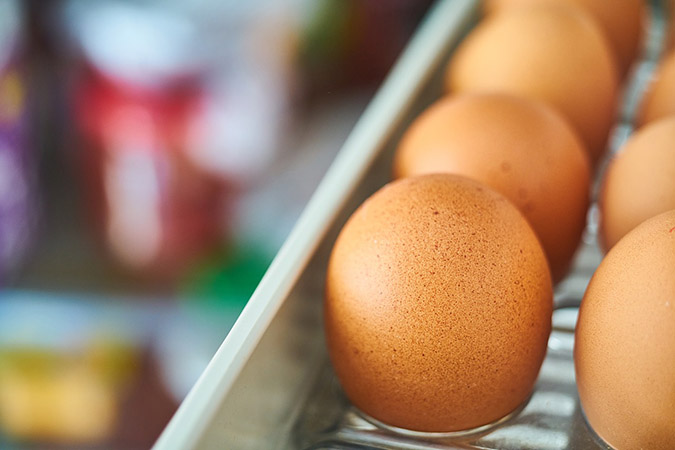
Image by Engin Akyurt from Pixabay
One thing we quickly learned was that eggs can be stored for up to 2 to 3 months at temperatures below 55°F without doing anything to them. This was great news, but we found that we had to carefully monitor the humidity. We discovered that it consistently needed to be close to 75%.
If the humidity level was too low, the eggs dried out; if it was too high, the eggs sometimes got moldy.
You May Also Enjoy:
“The 13 Best Chicken Breeds for Cold Climates”
“Chicken Coop Design: Meeting Your Chickens’ 6 Basic Needs”
“Cold-Weather Chicken Care: 11 Quick Ideas to Improve Chicken Comfort”
Also, it was important to use only clean, uncracked eggs. If the egg needed cleaning, we used it for breakfast and not for long-term fresh egg storage.
This is because when a chicken lays an egg, it has a natural coating on it known as the bloom. This bloom is a layer of protection for the egg that keeps out oxygen as well as harmful bacteria and germs. Anytime you wash or dry-buff an egg, you are removing that protective outer coating, which in turn allows bacteria to more easily enter the egg, causing spoilage.
Method #2: Mineral Oil Coating
Yes, this does work. Coating the egg with oil seals the shell to prevent evaporation during storage. The eggs you’re going to store this way should be oiled and stored within 24 hours of being laid.
This is critical, so it means that you will not be able to oil and save store-bought eggs for the long term. I have heard of folks who used store-bought eggs successfully, but it has never worked for me.
If you are able to have fresh eggs from your own backyard or a neighbor’s backyard every day, then this method may be right for you.
The process is really easy. And if you store them in a clean, closed carton in a cool, dry place, your oil-dipped eggs will keep for several months. I have kept them for a full year in my refrigerator!
How to Properly Oil Fresh Eggs
To properly oil your eggs, they must be at room temperature to start (anywhere from 50°F to 70°F), and they must be dry.
- Be sure that your oil is free of bacteria and mold by heating it to 180°F for about 20 minutes.
- Then, with tongs or a slotted spoon, quickly dip the eggs one at a time in the oil. (The whole dipping process takes a second or less and will not start to cook the eggs.)
- Set the eggs aside on a metal drying rack (not on paper towels or newspaper), and let them drain for about 30 minutes.
- After they are completely dry, pack them away in clean, dry cartons. I recommend storing them in the back of your refrigerator and using them within about 8 months or so.
Of course, these instructions for fresh egg storage only apply to eggs which you intend to cook prior to eating.
One really cool thing about preserving eggs this way is that if you love deviled eggs like I do, you will find that your deviled eggs will turn out better. This is because the shells peel off of older eggs easier and quicker when they are hard-boiled than they do with fresh eggs.
In fact, the only downside I have found is that once the eggs have been oiled, they’re no longer useful for making cakes or meringues. The oiling interferes with the foaming properties of the egg whites, so they no longer whip up as well as fresh eggs.
Method #3: Salt Preservation
This is another easy way to preserve fresh eggs. First off, be sure to use only truly fresh eggs that you have not cleaned. If they age more than 24 hours, your chances of success diminish rapidly. Also, exposure to extreme heat or cold will hinder your preservation process, so keep that in mind.
Next, stack the eggs and store them small-side down. I stored my eggs in salt, but your fresh egg storage can happen in any finely ground preservative you may have, such as bran, an equal mix of finely ground charcoal and dry bran, or finely ground oats. You can also store them in finely ground plaster of Paris, but that seems awfully unappetizing to me.
You can store the eggs layer upon layer as long as you make sure that they don’t touch metal, wood, or each other. Be sure you have enough finely ground preservative to pack them in well. Store them in a covered container, and keep it in a cool, dry place.
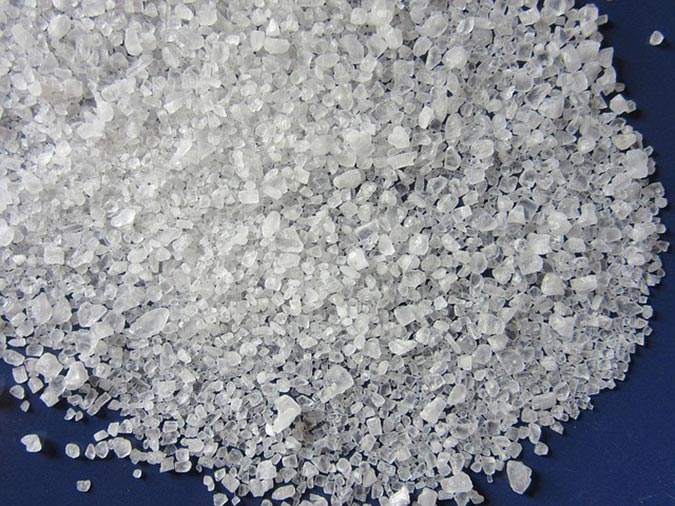
Image by Rupert Kittinger-Sereinig from Pixabay
Old timers often used a root cellar for this. However, see that you do not allow the eggs to be exposed to freezing temperatures as this will rot your eggs quickly. Properly prepared, these eggs will keep “fresh” for anywhere from 8 to 10 months. In fact, people in some countries are known to have stored their eggs in this way for up to 2 years.
If you are like me and you hate to waste anything, keep in mind that you need not discard the salt or bran you use for fresh egg storage. After you have used the eggs that were preserved in the mix, go ahead and feed the salt and bran to your cattle, or find another use for them.
Method #4: “Freeze Them Eggs, Son”
That’s what one local fella at the farmer’s market suggested. While I do not have a ton of freezer room, I do know that this works and is certainly easy to do. Freezing is the least time-consuming method for long-term storage, but it is energy dependent. Still, if you do have the freezer room, you might want to give it a try.
Eggs can be frozen in many different containers, such as freezer bags, mason jars, plastic containers, and ice cube trays. These frozen eggcicles perform much like the fresh version when thawed and used.
You May Also Enjoy:
“Using Game Cameras To Protect Your Backyard Chickens”
How to Store Fresh Eggs in the Freezer
To freeze, simply break the eggs into a bowl, beat or push through a strainer to combine the yolks and whites, and then pour them into your container and freeze. To save space, I pour the eggs into an ice cube tray and, once frozen, remove them from the tray and place in a freezer bag.
How to Use Frozen Eggs
As a guide, remember that:
- 1 “egg cube” = approximately 1 egg
- 3 tbsp. frozen egg, thawed = 1 whole fresh egg
- 2 tbsp. frozen egg white, thawed = 1 fresh egg white
- 1 tbsp. frozen yolk, thawed = 1 fresh egg yolk
The beauty of freezing eggs in smaller amounts, such as in an ice cube tray, is that they thaw quickly and allow you to throw together a really quick meal. Between quiches, frittatas, and even “breakfast for dinner,” we are never at a loss for great egg-based meals at my house!
Method #5: Homemade Powdered Eggs
Okay, okay, so I know that powdered eggs just don’t sound very appealing, especially for those of us who have served in the military. But when reconstituted, they have a taste and texture very similar to fresh or frozen eggs. And it is kinda cool that you can do this as a DIY project using a dehydrator.
In fact, it makes a great long-term storage option that requires minimal space.
You can beat the eggs together and dry them, or dry the whites and yolks separately. Reconstituted eggs can be used in the same manner as fresh eggs. You can even use the dried egg whites to make a nice, fluffy meringue!
You May Also Enjoy:
“How to Treat Rabbit Ear Mites”
I just had to try this! I dried a dozen eggs and blended them into crumbles, and they fit into a 12 oz. mason jar. If I had blended them even more, into a real powder, I’m sure I could have fit that whole dozen into a half-pint jar. That would be 4 dozen dehydrated eggs per quart jar—a really super use of my rather limited pantry space!
The only downfall to this method is the amount of heat that the dehydrator puts out. In the hot summer months here in central Texas, it might be a better idea to freeze the eggs and then thaw and dehydrate them when it is cooler outside.
You can use the powdered eggs as follows: 1 tbsp. powdered egg + 1 tbsp. hot water = 1 egg.
How to Dehydrate Fresh Eggs
- Line the trays of your dehydrator with parchment or wax paper, folding up all the edges to form a tray so the liquid eggs won’t slide off and make a mess.
- Break your eggs and stir to combine, or separate them and dry the whites and yolks on two different trays.
- Slowly pour the eggs onto the tray, moving your bowl around so as not to pool them in the middle. I also used a spoon to spread the eggs to the very edges of each tray. You will want a very thin layer so that they dry evenly.
- Dehydrate at 135°F for 6 to 8 hours or until no moisture is left. It took about 6 hours for a dozen eggs on one tray to fully dehydrate in my unit, but your time may vary.
- Stir the eggs about halfway through, or a skin will form on the top and outside edges.
- Once dried, crumble the eggs up and store them in a jar with a tight-fitting lid. Or go a step further and grind or blend the crumbles into a powder. (I put the egg crumbles in the blender and grind them up.)
- To use, reconstitute with hot water and then cook as normal. When using for baking, simply add the powdered eggs with the dry ingredients and add the same amount of water with the wet ingredients.
Eggs-cellent Ideas
Well, there you have it—5 easy ways you can preserve the bounty your hens provide. From “1,000-year-old” Chinese eggs to homemade powdered eggs that even the grumpiest old Korean War veteran would love, you now know of some great ways to have your eggs around even if your hens aren’t laying. Oh, and as for my neighbor, you can be sure he learned how to store fresh eggs in a snap—which was important because I wanted to go right out and get hens of my own!
What Do You Think?
What’s your favorite tip for how to preserve eggs? How do you ensure you have eggs through the winter months? Let us know in the comments below!
___________
This is an updated version of an article that was originally published on September 16, 2015. The author may not currently be available to respond to comments; however, we encourage our Community members to chime in to share their experiences and answer questions!
The Grow Network is a participant in the Amazon Services LLC Associates Program, an affiliate program designed to provide a means for our team to earn fees for recommending our favorite products! We may earn a small commission, at no additional cost to you, should you purchase an item after clicking one of our links. Thanks for supporting TGN!
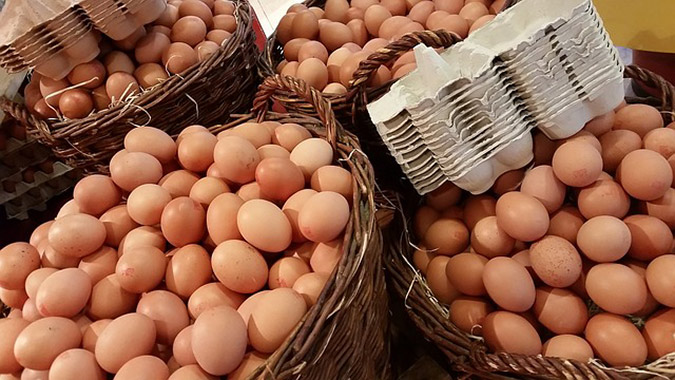
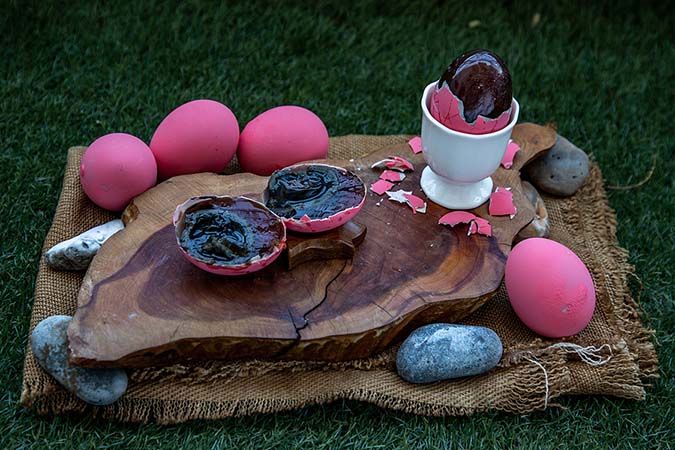
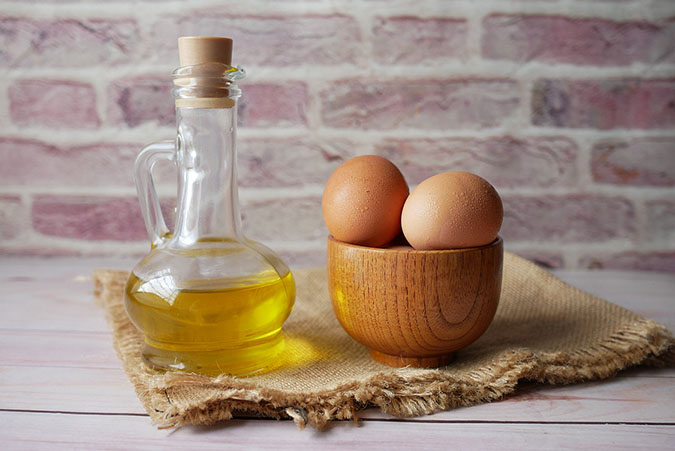
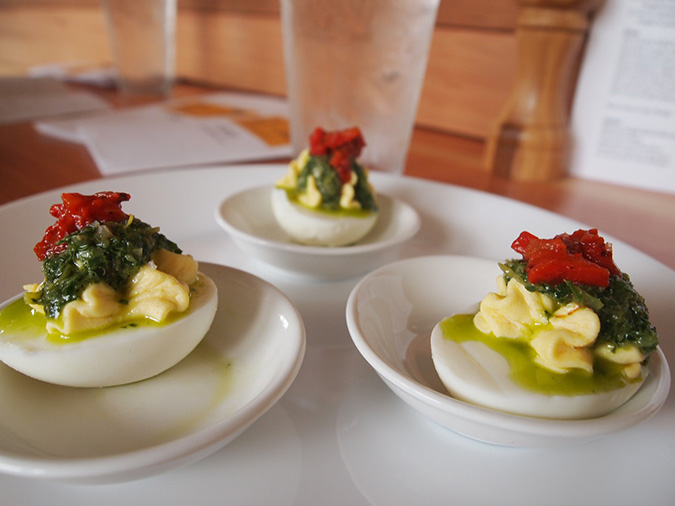
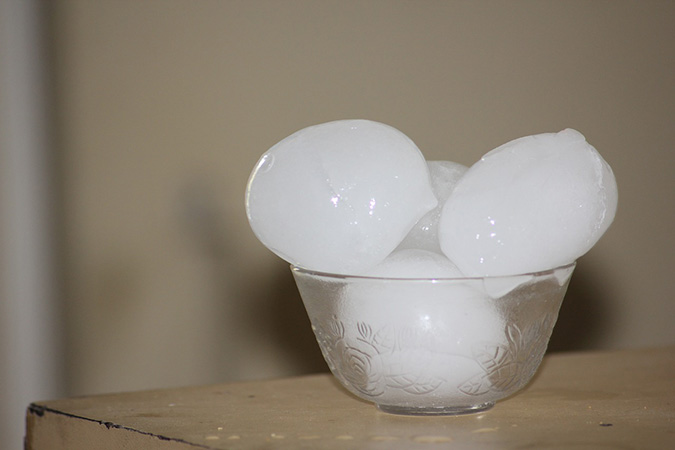
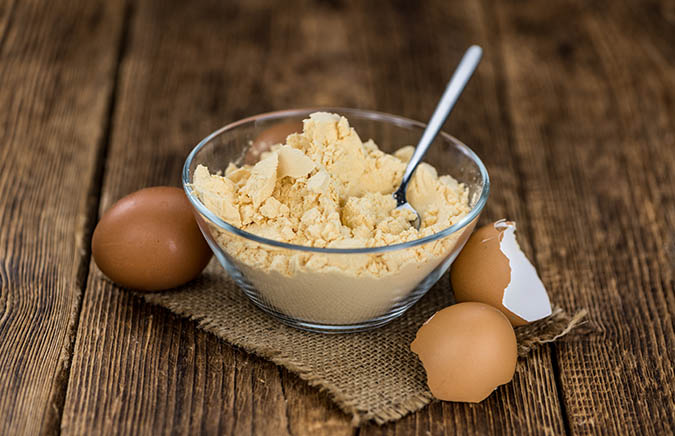
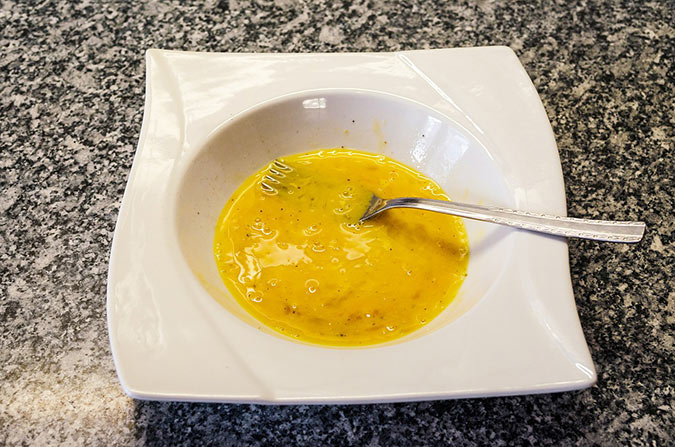







COMMENTS(46)
It is my understanding that dehydrating and powdering raw eggs is unsafe. There is a high risk of salmonella in the dust of powdered eggs. I cook my eggs before dehydrating.
The big downside to that is you can only use them as scrambled eggs. They won’t be useful in baking or anything else. But, as long as you know, it’s a great way to stay safe while preserving scrambled eggs!
Great article Joe! I have a book called Stocking up which recommends adding honey to the eggs before freezing. Great for using in baked goods. I also pickled some and canned them.
I’ve been raising chickens for 30+ years, and although I try to balance the flock so that we always have some heavy-bodied layers for winter eggs, an occasional hard winter will bring the daily production to one or zero. To hedge against that occurrence, about 20 years ago I started experimenting with freezing eggs. I have found, over time, that freezing them with a bit of honey goes a long way towards preserving the texture of the yolks. When used in baking, they are indistinguishable from fresh eggs. I have also tried adding salt to preserve texture. Some of the old homesteading books have you adding 1 teaspoon of salt per cup (about 5 eggs), which is an excessive amount for most any recipe. About a half teaspoon per cup seems to be the minimum to accomplish maintaining texture, but even that can be a lot of salt if you are scrambling a batch for breakfast. To overcome this, if I am freezing batches for “savory” purposes when honey would not be appropriate, I freeze in smaller quantities with a proportional amount of salt, and combine with fresh eggs when cooking. Between these two methods, we usually can get through even an exceptionally cold winter without having to buy eggs, and still do our usual amount of holiday baking and family breakfasts.
Yes I have chickens. AND they R laying MORE than we can consume… I recently found an article on Mother Earth News about freezing eggs and how to do it if U want to do different things with ur eggs… U want to bake with them – U want to cook with them, ETC>>> My friends love when I visit>>>
I gained lot of information to prepare ready to cook products which I am developing in India, Bangalore.I thank him for giving such valuable tips on egg preservation
With regards
Ananthu
Mobile no. +91 7411635048.
Mail ID ananthu @ yahoo.co.in
I was surprised you didn’t mention pickled eggs. It is a great fast alternative to eggs that can be used quickly in egg salad, potato salad etc.
I see you posted this a year ago. What I like to do is make egg sandwiches with pickled eggs. The eggs are always handy & all you need to do is chop up the eggs & add mayo
I saw that post, but didn’t get it saved to my memory banks…. 😉 Could you share the link again? Thanks!
Good article, this has been on my mind for a while and done some research, I currently get fresh eggs delivered to me but plan on moving and starting a nice coop in the future, I eat at least 6 eggs every day and after a good 20yrs into natural health research I believe a natural farm raised egg is the single most nutritious thing you can eat especially the yolk . I remember hearing about the 1000yr old egg about 20 years ago on a TV program and believed it was also called a tea egg ??? but I remember they used tea leaves as a main thing to preserve realize green tea being a mega antioxidant source.
One concern in the article is the use of mineral oil this is petroleum based product with carcinogenic concerns, a great alternative to look at is coconut oil ultra healthy and has total antibacterial properties.
I have a newspaper clipping from 1974 that talks about a crock of eggs stored in salt that was found on an apartment property that was formerly a hotel built in 1894. The previous owner of the property said the eggs were probably 60 years old, as that is the last time chickens were raised on the property. The then-current owner said the eggs appeared to be edible though she wasn’t going to try them. She said there was a faint smell of camembert cheese when cracked open!
Helpful article. The instructions for mineral oil do not say to cool the oil before dipping the eggs. I would think dipping the eggs in oil that hot would cook them a bit inside. And you literally just dip and remove to a place the eggs can drip dry?
Enjoyed reading this and plan to try.
great ideas. Thank you for sharing. I have been freezing my eggs for years. Is there a printer friendly version of this article available?
Ive been looking for this info! Thanks so much. I had read about the century/1000 year old egg and it did not sound good; sulfery/ammonia smell was what Wikipedia said.
You can pickle hard cooked eggs. I saw them in bars a long time ago before they all had “… & Grill” tacked onto their names. Made some recently and they were good. Recommended to keep refrigerated, but they were just on the counter back in the day.
Wow! I never knew you could dehydrate eggs! And I accidentally put a carton of eggs in the freezer once. Most of them cracked, so I boiled them lightly and fed them to the dog. But the ones that hardly cracked or didn’t, went into a frittata. I was shocked eggs could be frozen too! Anyone ever try hard boiled eggs frozen?? That would be convenient for snacks and deviled eggs. I wonder if the consistency changes…and if we can freeze them hard-boiled with the shell on or not. Hmmmm
Please consider some of the hidden consequences of eggs. While ubiquitous in our society, there are some serious, devastating impacts of egg production which occur throughout the industry, even with backyard hens that may be treated well. Here’s a few: all male chicks in the egg industry are killed because they’re considered useless, as they don’t lay eggs. They’re usually ground up alive, or gassed or suffocated in plastic bags. Chickens are descendants of wild jungle fowl of Asia who enjoyed perching in trees. Today’s chickens have been genetically and selectively bred to lay about an egg a day, and their bodies are not designed to tolerate this abuse, which depletes them of calcium and other nutrients. Once their egg production declines, average 18 months, their utility is gone and they are killed. Chickens are much smarter than most people realize! Hens and chicks ‘talk’ to each other even before chicks hatch. Hens are natural moms and chicks need to care, warmth, and comfort of their mothers for a while, which they will not likely get because most backyard hens were chicks that were shipped in the mail. Kind of crude. There are many other ways to obtain ALL necessary nutrients from food that do not require exploitation of animals, fowl, or fish. They are all sentient beings with interests in life and an existence that naturally extends over many years. When turned into commodities, their value is assigned by people according to their utility, not according the inherent value of their life.
Thank you for taking the time to read my concerns. Peace. Compassion. Justice.
Nancy P… Humans are omnivores and nature dictates that we eat as omnivores as that is the only way for omnivores to be healthy. I get that you bought into the moronic lies of vegan/vegetarianism, and I agree that the commercial chicken industry puts evil greedy profits above all and disrespects life and even embraces cruel evil practices. But that doesn’t mean that adopting a bad moronic diet (that requires supplements to maintain any semblance of heath) and thereby shooting yourself in the foot is a viable solution. Humans can survive on a vegan diet just like we can survive on a high fat, all meat diet (as humans in the arctic do every winter), but there is a huge difference between survive and thrive.
If you choose to believe the stupid lies of veganism and PETA then that’s your choice. But don’t spread that crazy to others, especially not a homestead centric site like the grow network. PETA could do a ton of good in the world if they refrained from their crazy lies and vegan propaganda, but they don’t and they have zero credibility as a result. The vast majority of homestead minded folks value and respect life, and honor each life we consume by not wasting anything (hence the interest in not wasting eggs).
If You don’t have the physical parts needed to be an herbivore, then trying to survive on the diet make no sense. In the immortal words of Jack Nicholson/Melvin Udall… “Where do they teach you to talk like this? In some Panama City “Sailor wanna hump-hump” bar, or is it getaway day and your last shot at his whiskey? Sell crazy someplace else, we’re all stocked up here!”
Very disappointed to read this aggressive and ignorant reply to what was a thoughtful, respectful and relevant post. Surely we welcome all relevant points of view. And if not why not?
Sorry that person left such a disrespectful reply. You’re post was timely and thought-provoking.
Yes, chickens are brilliant! My favorite animals to share the world with.
Originally I got a few heirloom chickens from a local poultry farmer & really felt I was freeing them from prison, as it is no life to live in a cage. Two of the hens are moms now, & indeed tender & loving. What I didn’t expect was that the other hens looked over the chicks like Aunties… Absolutely adorable! All our chickens are free-range, though we do tuck them in at night to prevent them being taken by predators. But at sunlight, they’re out & about, every day (as it’s mild here in southern Portugal).
Yes, we do eat their eggs, because they’re healthy & delicious & would go to waste otherwise.
They lay near the house, sometimes behind the chimney, & have never freaked out from me taking them, as I always leave one behind from each hen until they lay another. (They do freak out if a mongoose or other predator eats them, by the way; so yes, they’re sentient. & no, they really don’t mind sharing eggs with us. I leave them all once a hen goes broody.)
They’re all named & loved, some hand-fed & others fed frequently their favorite snacks from the porch. They eat leftovers as a favorite dog or cat might. They love tagine & couscous, & tons of garden veggies. & when the grapes ripen, they get bunches a day.
Yes, they’re family & siblings for my only daughter.
When one was mercilessly killed by a neighbor’s dog,
we had a funeral & burial under the orange tree.
People who raise chickens aren’t all heartless carnivores.
I’m a lifelong vegetarian (probably because I disliked the taste of industrial meat as a child)
& look after my flock with compassion & empathy.
So please don’t berate us homesteaders by equating us with the inhumane chicken industry.
I realize the author @Nancy P left this comment a while ago. When looking at her site, she Is as @cre8tiv369 states someone who “If you choose to believe the stupid lies of veganism and PETA then that’s your choice” which may be a tad harsh to lump all the noble tenets of the animal welfare lobby into a “stupid lies” category. Still, they do have a critical point in calling out dogma and left-wing ideology over practical and respectful resource management.
The knowledge that comes from being a producer of plants for human consumption will quickly educate you on the necessity of an integrated animal/plant system as one feeds the other and the mutual symbiosis of wholistic management of resources.
For the record, We have been educators of the alternatives for conventional meat-based diets, footwear for running, debt-based consumption of goods and materials, and other unconscious accepted lifestyle practices for many years.
Comments like from Nancy P are versed in the vitriol of dogmatic responses only echoing an ideology and far removed from the reality of consistently producing food day after day week after week.
It becomes more and more evident to me how far removed the majority of the “vegan” religion is from the very “Mother Earth” they have as a pseudo god.
A reality is Mother Earth is vicious and uncaring. In an unsheltered world far from your Fav local markets, social media warrior keyboards, religious ideologies and trendy vegan cafes, every element of Mother earth care very little if you survive or not.
When reality meets rhetoric the level of humanity is tested, by and large, the abandonment of ideology for survival is always the result, I hope amongst the coming changes of growing zones and food production, self-sovereignty and self-reliance are being practised amongst whatever “ism” you ascribe to.
I LOVE, LOVE, LOVE this article! I don’t think I’ll be trying the 1000 year old egg recipe, but wow – who knew you could oil your eggs! Thanks so much for sharing this very valuable information, Joe! I will certainly be using it, as I have 23 chickens on my farm and more on the way. Definitely think this article is a winner!
Smiles,
Miss Charlee
I have oiled my eggs really thick and they have lasted at least 2 months and I have some now going on 8 months. Thanks for the process to make powder eggs. I will be trying this!
Fabulous article! Only one question: after dehydrating eggs into a powder, do you need to do anything to keep them long term in the jar, like pressure canning or anything? Thank you so much!
Thanks for the terrific ideas an preserving eggs. I raise a small gaggle of geese and enjoy them all year long. They only lay huge eggs a few months in the spring but now you gave me far more ideas for preserving them for the barren months. Super duper ideas – Kitty
I would love to know if there is a better oil alternative to mineral oil as mentioned in method #2. There are many health concerns related to mineral oil, so this would be a storage option that would not be an option for me. Thanks.
lard instead of petroleum based mineral oil maybe… it seems t me I read a book in gradeschool about transporting a barrel of eggs in lard across the country in a covered wagon
Excellent article. Not only informative but tells you exactly how to do everything. Thank you!
You didn’t say that fresh eggs do not have to be refrigerated or how long they will be fresh without refrigeration. WhenI was llittle and we had chickens, eggs were never refrigerated.
‘lizabeth – eggs are dipped only momentarily, before heat can penetrate. Besides the egg white protein is a poor heat conductor.
BTW – You wouldn’t worry about “Baked Alaska” melting on you, would you?
For those who never had Baked Alaska, it’s a generous serving of ice cream in a deep dish, and a cake with browned meringue on it (by baking it)
my 1915 cookbook used the lime brine but I’m going to try the others.wanted to know what type of lime-from the co-op-agricultural lime?
It’s called water glassing. Please see Kandy’s reply (and my addition) below in the comments.
I would like to share what I have learned about one of the best resources to the Homesteader the Egg. The Egg is a perfect creation and will last a very long time as long as we leave it in its natural state. There is a coating on the outside of the shell that protects the egg. If this coating is washed off the will instantly start to decay (rot, go bad) so you will need to preserve it. But if you leave the Egg unwashed it does not even need to be refrigerated. I have eaten unwashed eggs that had no refrigeration that were 6 months old and were as good as the day they were laid. I first learned of this when I was in South Africa were they do not wash or refrigerate their eggs. I understand that most of Europe does this as well. Here in North America not only do we wash them, we use acid commercially. So if you want to eat a perfectly preserved Egg, just leave the cleaning until you want to eat it. Cheers to TGN
I liked the article and many of the comments that add to the discussion. My personal preference is not to have extra eggs and use methods that keep chickens laying year round. (Grow lights on timers to supplement shorter days of winter, and I feed my chickens the meal worms and insects I grow along with sprouts when the pastures are not good during winter).
Growing insects is easy and cheep and they are incredible sources of protein for birds, fish, pigs, and humans. Extending daylight for the chickens and heating the coup means egg production continues in the winter. I suspect both of those could use their own articles respectively.
My extra eggs go into the incubator and hatch into chicks, which grow into chickens, which some will cull older laying hens (when they start producing eggs themselves), or they end up growing to eating size and ending up in the freezer (including extra roosters, but I like to keep at least 3 roosters per flock, a wise older rooster and 2 younger rooster apprentices).
So I eat the eggs I need and grow the ones I don’t and I don’t bother with egg preservation because my chickens lay eggs in the winter. While this may not be possible for some folks, it is something to consider for others that might prefer to freeze a chicken rather than an egg and prefer fresh eggs in the winter.
Although I do like a good pickled egg… But there is no way I would put petroleum oil aka mineral oil on anything I would consider eating. I would think coconut oil would be a much better choice worthy of trying. Coconut oil is naturally antibacterial, and might have the stamina to last without going rancid for the duration desired.
This is a little more work, but lasts like Military food rations ~50 years.
Hard boil small batches of eggs for a complete 4mins. If you got an Insta-Pot, that will work better.
Peel the eggs.
Cold water rinse only.
Slice in halves or quarter layers.
Place on tray in a freeze dryer.
Store in a clean, air tight container like a Mason jar that you can vacuum seal the lid closed.
Best to do in the Fall as humidly is lower. Pack all you can tightly fit into the Mason jar.
Store in a cool dry place with no sunlight like a cellar or basement food pantry.
When I was a kid, some 60 years ago, we us;ed to keep eggs covered in a pail of “water glass” ?? I think that’s what mom called it.
I’ve read about water glassing. The cautions that I read about are that the eggs have to be very clean (not by washing, clean out of the nest), and they can’t be fertilized eggs (which won’t last).
Wow, wonderfully written and very informative. We are planning to acquire some chickens soon and this will be a great resource to look back on. Never heard of using mineral oil to preserve eggs! Very cool!
Well, I was so inspired by this blog that I decided to purchase 22 chicks! 10 Rhode Island Red hens, 1 rooster, and 10 Black Astrolops hens and 1 rooster! They’ll be arriving at the end of July, which gives me plenty of time to prepare!
My girls are still laying into the winter; they have a lot of sunshine and additional greens. They have slowed down a bit but in the summer; we have eggs and lots of them. I keep my children stocked in eggs, and I still have some so I have frozen and dried them. My Army time has made me less keen on powdered eggs, but I did add to more ways to preserve eggs. From my mom, I learned how to pickle them. I use a cup of beet juice, a cup of water, a cup of cider vinegar and boil it for five minutes, then I pour it over peeled boiled eggs. I put mine in the fridge, but my mom swears you can leave it out on the shelf; I would not do this unless I used a pressure cooker or hot water bath canning method. My kids love them. Sometimes, I leave the beet juice out or I put in different spices. It is fun.
The other method is to make baby quiches (egg bites) and freeze them in wax paper Thirty seconds to cook. I rarely keep them over a month because they are a popular item at my house
I have some young hens (12) that we got as chicks in early July and they are starting to lay. We got three eggs today! (12/21) the shortest day of the year here in the northern hemisphere! (Southern Missouri, USA) I am thinking that I will try to do the same next year so that I have chickens laying during the winter!
I would like to add two more methods of preservation- freeze drying and water glassing. There are lots of videos explaining these methods. Water glassing was found to last a long time with an extremely high success rate. It’s basically pickling lime (i.e. hydrated lime or slaked lime) dissolved in water. Only fresh clean eggs will work, they must have the bloom on them or they will pick up a lime flavor and potentially be unhealthy. They can last between 12-18 months. There is more to it, so research it before you try it.
Freeze drying works great, though you can’t really do a whole egg. It’s either yolks only, whites only, or raw scrambled eggs. You have to get ahold of a freeze dryer or find someone willing to rent their’s out. Ups- when properly stored, these raw, waterless eggs can last up to 25 years! Downs- you won’t get a good over easy egg out of it, and you will need water to make them useful.
As I mentioned above, only unfertilized eggs should be used. Most sources I found don’t mention that.
Brilliant!
Excellent article. I’m not sure that I would want to use mineral oil to preserve my eggs, just because I don’t think you could use your eggs without getting some of the mineral oil on the egg you are consuming. I recently read an article about oiling the eggs with butter which I would find more acceptable. In that article, they took fresh warm eggs and hand rubbed the eggs with butter. Again, the eggs had to be very fresh and unwashed. They said that the eggs preserved that way had a nice buttery flavor.